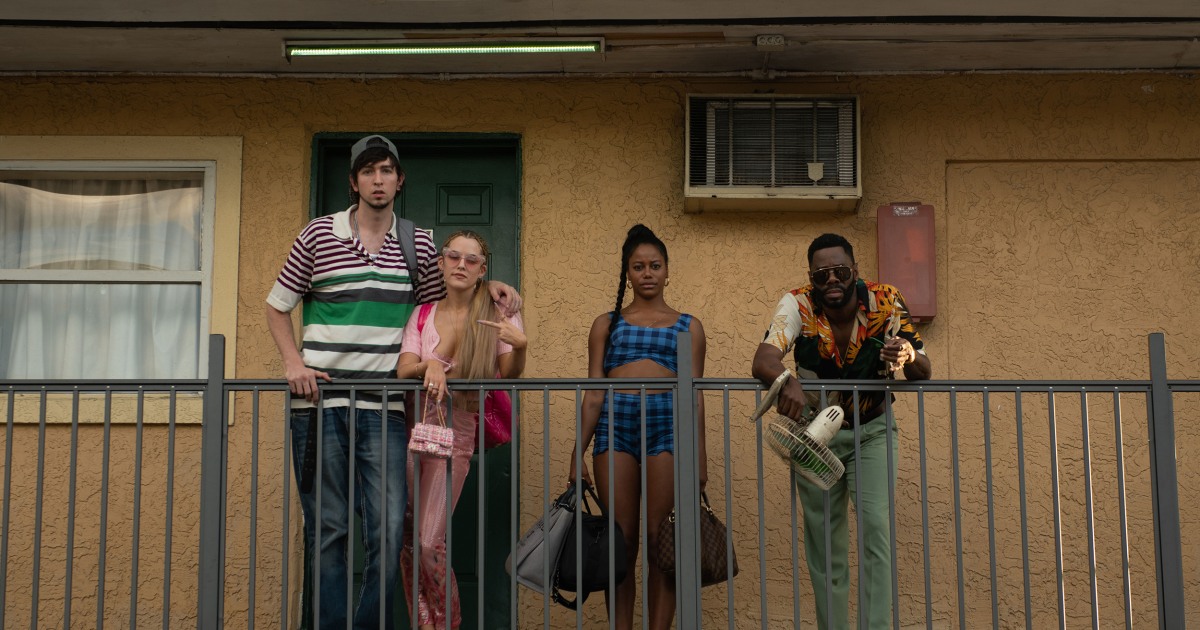
A’Ziah “Zola” King unleashed a 148-tweet tale on the world in 2015 with the words “Y’all wanna hear a story about why me and this b—- here fell out? It’s kind of long but full of suspense” and created one of Twitter’s first viral threads before “going viral” on Twitter was even something to which most people thought to aspire.
The thread — detailing the fallout from when the then-19-year-old dancer Zola met a sex worker named Jessica and accepted an invitation to join her on a “hoe trip” to strip clubs in Tampa, Florida — caused a whirlwind, gaining social media momentum and mainstream attention until it was transformed into a full-fledged film, “Zola,” which premiered at the Sundance Film Festival in 2020 and arrives in theaters Wednesday.
That film is directed by Janicza Bravo (who co-wrote it with “Slave Play” playwright Jeremy O. Harris) and stars Taylour Paige of “Hit the Floor” as King, Riley Keough of “American Honey” as Stefani (the stand-in for Jessica), Nicholas Braun of “Succession” as Stefani’s dazed boyfriend Derrek and Colman Domingo of “Fear the Walking Dead” as Stefani’s aggressive pimp X. It also tells King’s exhilarating story nearly exactly how it is meant to be — playful, shocking and with touches of soap opera-worthy embellishment — probably because King served as an executive producer and collaborator on the film.
But the film you almost saw would’ve been assuredly different. After King’s story went viral, Rolling Stone contributing editor David Kushner wrote “Zola Tells All: The Real Story Behind the Greatest Stripper Saga Ever Tweeted” for the magazine — one of many mainstream outlets and writers to monetize King’s virality in ways she could not. His article was optioned for the movie (and he, too, is an executive producer). Within a year, James Franco was set to be the director with the script written by Andrew Neel and Mike Roberts.
The protection Bravo offered King and her story could only come from a Black woman — and the resulting movie is partly a commentary on the co-opting of Black culture by white people.
It was only after Franco left the project in 2017 that Bravo and Harris came on board. Though Franco had interviewed King as part of his project and secured her some money for the rights to her story, it wasn’t until Bravo and Harris took the helm that they actually included her in the process (and secured her more money, on par with her role).
“I will say this very much on the record, that the way that Janicza navigated getting this woman the respect she needed,” Harris stated in a New York magazine profile earlier this month. “She did backflips for three years to make sure that Hollywood bureaucracy did not, once again, profit off of a Black woman’s story, a Black woman’s pain and a Black woman’s complexity without fairly compensating her.”
The protection Bravo offered King and her story could only come from a Black woman — and the resulting movie is partly a commentary on the co-opting of Black culture by white people, which is seemingly what the original script would have done.
Social media is also a major character in “Zola,” which speaks to the influence of Black millennials on the broader American culture; those demographics use Twitter more than any other (though the ruling sites are the older, white-centric YouTube and Facebook) and Black users spark viral conversations on a regular basis.
The influence of Black millennials on white culture and their broad reach on Twitter was seen most recently when Black dance creators went on a TikTok “strike,” refusing to create dance moves to Megan Thee Stallion’s hit song “Thot S—,” in response to white TikTokers who have continually stolen their dance moves without credit on a platform with an algorithm that seemingly privileges white creators. The protest movement garnered broad mainstream awareness and even media reach once it rapidly spread on Twitter.
Bravo and Harris’ script also richly skewers the white appropriation of Black culture seen on and off social media.
Rather than presenting King’s Twitter thread as a simple narrative in movie form, Bravo opted to shatter the fourth wall and bring viewers directly inside the platform. She uses the all-too-familiar Twitter post notification sound effects when the character Zola spouts the real-life King’s viral phrases (“vibing over our hoeism” and “p—- is worth thousands”) so that, with every chirp and ding, Twitter users who followed the story in real time find themselves transported back years, reading as the saga unfolded.
To make it even more of a social media user experience, the screen flashes and clicks every time Zola and Stefani take selfies in the strip club’s dressing room.
The film’s use of trippy, saturated color theory adds to those effects, creating a fantastical, “uncanny valley” visual that is reminiscent of the neon weirdness of 2012’s “Magic Mike” (also set in Tampa) and “Spring Breakers” (also an A24 production that ironically stars Franco).
Bravo and Harris’ script also richly skewers the white appropriation of Black culture seen on and off social media. Like the aforementioned TikTokers, Stefani teeters between appreciation and appropriation: In one of the standout scenes, she is face to face with the character Zola, repeatedly referring to her friend as “sis” in a white person’s imitation of an exaggerated Black “hood” accent, as if she’s a malfunctioning robot.
In another scene during the car ride to Florida, Stefani and her white boyfriend fearlessly shout the drug dealer slang, sexually explicit metaphors and racial epithets found on Migos’ “Hannah Montana” and 2 Chainz’s “Watch Out,” respectively — both of which were huge trap anthems in 2015 — as Zola cringes at their try-hard clownery in the back seat.
Yes, “Zola” is meant to be funny — and it is. But Zola and Jessica also both narrowly escaped the seedy world of sex trafficking, and what makes the film unique is that it showcases how Black people often use humor to survive trauma.
“I think it shows how easy it is to get trapped, to get bamboozled in a situation like that,” King told New York magazine of the film’s unfiltered depiction of sex workers. “It’s not always violent. It’s not a white van pulling up and snatching you and throwing you in the car, tying you up; it’s not ‘Taken.’ Your homegirl invites you to Florida, and you never come home. Like that.”
Luckily for King, she did end up coming home — and kept her identity intact while telling her story. Because of her, Bravo and Harris, it’s only a matter of time until the next Black innovator who has an equally electric story to tell is able to tell it.
Source: | This article originally belongs to Nbcnews.com










